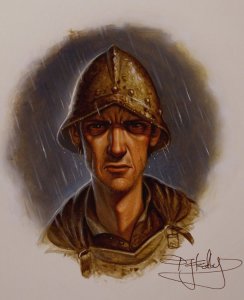2010.07 – 7. Night Watch – Terry Pratchett (2002)
Of the various story arcs and one-offs presented by Terry Pratchett in his wonderful Discworld series, the City Watch cycle is definitely my favorite. Usually, but not always, confined to the Discworld’s de facto capital city Ankh-Morpork, these stories are the least specific in terms of theme. Whereas many of the one-off novels deal with the Discworld-ization of a very particular subject, say, Rock ‘n Roll, Hollywood, or Newspapers, the City Watch books are most of all about people, who live in a city, and who do stuff. I.e., they’re about the human condition.
The protagonist of the Watch books (and Captain/Commander of the Watch itself) is one Sam Vimes, who as best as I can tell is the closest thing to an autobiographical character found in Pratchett’s writing. Vimes is an everyman, with failings and virtues and a nicely textured history and personality; when he complains about his boss, or kisses his wife, or feels overwhelmed by his quotidian responsibilities, one can forget that the setting of the book also includes trolls and dwarves, giant space turtles and wizards in pointy hats, etc.

Pratchett's everyman, Sam Vimes: Copper, Duke, Loving Husband, Dry Drunk
Night Watch is essentially a time travel story (featuring the wonderful History Monks), through which Pratchett is able to give us a full novel’s worth of exposition of his most sympathetic and realistically drawn character (Vimes), along with that of a few others (notably Dibbler the sausage vendor, and Lord Vetinari, the ruler of the city) and the city of Ankh-Morpork itself. The end product is an exploration of the life of little people in the big city, with themes like class, poverty and fear of authority taking a central role. (For anyone who hasn’t read Pratchett, I want to assure you that it’s also very funny and not all maudlin like I’m possibly making it out to be.)
There are some bitingly poignant scenes in this book, around the idea of friendship and grief – a fallen comrade, pining for one’s family – and I can’t help but think that the depictions of poor city dwellers is a mirror of Pratchett’s own childhood, growing up poor in post-WWII England. I don’t want to spoiler anyone but the marching song the soldiers sing is particularly moist-eye-making, and used to great effect by Pratchett (again, despite how it sounds, this is above all a humorous book!).
No comments:
Post a Comment